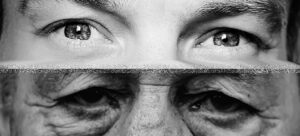
younger eyes, older eyes

younger eyes, older eyes
In this week’s Torah reading, Vayelech, “he–meaning Moses–went” and spoke to the Israelites. He told them, “I am now one hundred and twenty years old, I can no longer be active (literally, ‘come and go.’)” There are many ways to interpret this idea of not being able to “come and go,” and our sages came up with a few. Many link this statement with the next verse, “And, the Lord has said to me, “You shall not go across the Jordan (River),” but to them, Moses’ statement doesn’t suggest a physical disability, but the fact that he lacks Divine permission to cross the river and to bring the Israelites into the Promised Land. It could also be that he was no longer able to lead the people once they’re in the land, because a new type of leader was needed.
When we translate lo oo-chal od la-tzeyt v’la-vo as “no longer able to be active,” it sounds as if Moses is saying, “Hey, I’m 120! I can’t do what I used to do.” And he may be right, but when we juxtapose this with almost the concluding verse of the Torah, “Moses was a hundred and twenty years old when he died; his eyes were undimmed and his strength had not let him,” we have the stuff that keeps rabbis up at night.
This is a Kushia! It’s a contradiction, isn’t it? Or, “Houston, we have a problem!” How can the Torah, the biblical narrator, tell us that Moses at 120 was like an 80-year old, or a 20-something, if Moses himself said otherwise?
How do we reconcile this? Well, the Talmud, in tractate Sotah, has a thought. The Mishna asks, “And Moses went up from the plains of Moab to Mount Nebo,” so how could he have been physically restricted from “coming and going”? Another teaching, called a baraita, comes in to say, “There were twelve steps there to ascend the mountain, upon which Moses was to be buried, and Moses stepped over them all in one step, also indicating that he was at full physical strength.”
Now that I’ve shown you an example of how the Talmudic mind works, here’s how my mind works. To me, the contradiction of these two verses is resolved by looking at them through the lens of how we see ourselves as opposed to how others see us.
If we think back to parashat Shelach Lecha, where the spies came back with a report that the men in Canaan were so large, “we looked like grasshoppers to ourselves, and so we must have looked to them.” (Num. 14:33) Certainly these spies had no idea what the people of the land actually thought of them!
Moses, at 120, saw himself as physically diminished, but God–or the biblical Author or author, sees him as not showing visible signs of aging; his skin wasn’t wrinkled and dry, his eyes weren’t clouded with cataracts, and others didn’t think he looked 120.
Feeling diminished in intellect, in ability, in talent… happens to us at all ages, but it’s important to learn to see ourselves as others do, as capable, intelligent, strong people who have a contribution to make to the world, and as Moses didn’t stop until the last moment, we have the ability to continue as well. My friend and colleague Pastor Dan Quagliata commented, “I continue to learn so much from those who perceive their work is “finished.” We’re never done and always have something to offer.
May each of us be blessed to continually see what we have to offer, and to encourage others to see the potential in themselves.









What a profound insight. I will be sharing this widely in your name. Thank you for the thoughtful interpretation.